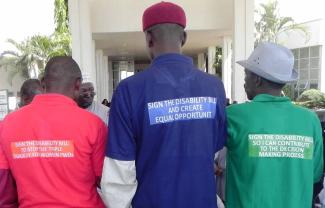There are roadblocks to a strong democracy in Nigeria at all levels of government. Conflict—triggered by political competition and communal, ethnic, religious or resource allocation rivalries—poses a major threat to democracy. Corruption pervades the daily lives of Nigerians. Many government institutions do not adequately engage with citizens or the private sector and lack the capacity to carry out their mandates. Further, civil society lacks both the capacity and the resources to effectively engage with government and advocate for change.
Civil Society and Media
Although elites dominate the political structure, civil society organizations are becoming a voice for democratic reform and government accountability . Their efforts to push for inclusive governance have been successful in many ways, but they lack the capacity and resources to function optimally. USAID works directly with a diverse representation of Nigerian civil society organizations, building their internal management capacity and strengthening their ability to engage with the government on issues of fiscal accountability, budget monitoring and transparency in governance.
Elections
In 2015, Nigerians participated in what were arguably the most credible and transparent elections since the country’s independence. USAID capitalized on this positive momentum to improve elections by supporting the organizational development of political parties and the independence of the electoral commission, and by increasing civil society input into electoral and constitutional reform dialogue. From 2015, the Independent National Electoral Commission working with civil society organizations-which ran parallel vote tabulations- helped usher in the first peaceful, democratic transition of power between two parties. Additional engagement in this space saw an amendment of the electoral law in 2022, a surge of youth participation in the 2023 election process, and increased accessibility of election materials for marginalized populations.
Working in Crisis and Conflict
Our programs strengthen the capacity of civil society groups, government officials and religious leaders in select states to mitigate and manage conflict in their communities. Using a multiple sector, community-based approach, projects draw on the expertise of religious and traditional leaders, women and youth groups, government officials, and civil society to develop an early warning system, protocols, and reference materials to improve responses to outbreaks and threats of violence.
Ongoing conflict, organized armed group (OAG) and organized criminal group (OCG) activity, recurrent climatic shocks, and internal and regional displacement have generated significant humanitarian needs across Nigeria. OAG attacks since 2013 and subsequent clashes with government forces have resulted in high levels of insecurity in northern Nigeria, displacing approximately 2.3 million people and generating severe protection risk for civilians. In 2024, approximately 7.9 million people in northeastern Nigeria are expected to require humanitarian assistance, including emergency food assistance, safe drinking water, and relief commodities, as well as health, nutrition, protection, shelter, and water, sanitation, and hygiene (WASH) interventions. Separately, in northwestern Nigeria, OCG activity and intercommunal conflict have generated widespread humanitarian needs, displacing an estimated 1 million people within the region. In response, USAID is providing life-saving food, shelter, nutrition, protection, WASH, and other sector assistance to at-risk communities across the country. USAID funding also mitigates the effects of climatic shocks on vulnerable populations in Nigeria and works to improve communities' resilience to shocks.
Related Links
Success Story: Supporting Conflict-Affected Communities in Nigeria Through Moringa Tree Cultivation
Success Story: Scaling Up Food Assistance in Northeastern Nigeria
Success Story: Expanding Humanitarian Access in Northeastern Nigeria

International Republican Institute
